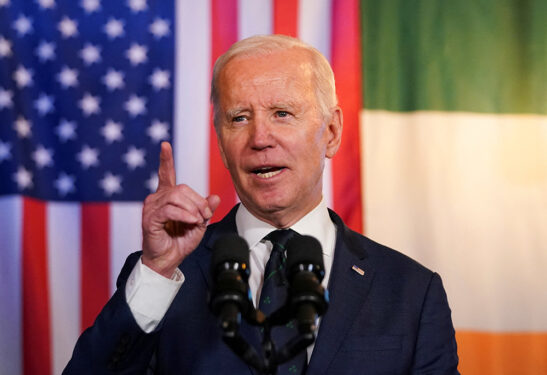
PROSPECT HEIGHTS — When President Joe Biden delivered his inauguration speech on Jan. 20, 2021, he used the word “unity” eight times. The first time he used it was to say it’s required “to restore the soul and to secure the future of America.” The last time he used it to say that “together, we shall write an American story … of unity, not division.”
More than two years later, the country remains partisan and divided. Political analysts, acknowledging that there’s realistically only so much any president can do to unify the country, say that Biden’s rhetoric has fallen short of that unity pledge so far through his first term, while his bipartisan legislative achievements have exceeded expectations.
When it comes to rhetoric, Brian Browne, a political science professor at St. John’s University, noted that Biden has been quick to use binary contrasting language to make a political point — the 74 million people who voted for Donald Trump he has labeled “MAGA Republicans,” and throughout the COVID-19 pandemic he separated people as vaccinated and unvaccinated.
“It was divisive language,” Browne said.
Samar Ali, co-chair of the Vanderbilt University Project on Unity & American Democracy, noted that Biden’s rhetoric after the Jan. 6, 2021, insurrection at the U.S. Capitol is another example, saying that his speech and subsequent comments were an opportunity “to rally the people around unity.” Instead, he has labeled the culprits domestic terrorists.
“I think that’s a step too far,” Ali explained. “That language coming from the White House, if I was giving a grade there, I would say that we could do better.”
By and large, it appears Biden preaches unity in big moments, and stokes the flames of partisanship with rhetoric similar to that mentioned above thereafter. Both in his remarks ahead of the midterm elections last November and in his State of the Union Address this past February, he emphasized the importance of a unified nation.
In November, he identified the threat of “extreme MAGA Republicans” to democracy but emphasized that is only a minority of the Republican Party. He closed that speech with a message that “there’s nothing — nothing beyond our capacity if we do it together.”
The president’s State of the Union address remarks echoed those of his inauguration.
“We must be the nation … that embraces light over darkness, hope over fear, unity over division, stability over chaos,” Biden said. “We must see each other not as enemies, but as fellow Americans.”
While those messages to the American people are perceived as hit or miss when it comes to unity, the political analysts give Biden high marks for his ability to bring together a divided Congress in order to get legislation across the finish line.
Through Biden’s first term, Congress has come together to pass a number of bipartisan bills including: a $1.2 trillion infrastructure package, the CHIPS and Science Act, an expansion of Veterans’ benefits in the PACT Act, the Respect for Marriage Act, the Safer Communities ACT that was the first major legislation to address gun violence in nearly three decades, and the Postal Service Reform Act. Although rocky, in the latest example, Biden and congressional leaders were able to reach common ground on a debt ceiling bill.
“We’re still very polarized. People’s opinions of Biden are still very partisan,” noted Dave Hopkins, an associate professor of political science at Boston College. “But you look a little closer and, in some cases, he has shown the ability to bridge some of those partisan divisions.”
Others, however, note the discrepancy between his public rhetoric and political actions. Ali argues that using rhetoric to unify the American people should be as much of a priority as actions behind the scenes to unify Congress.
“Words, especially from the president of the United States, are shaping people’s relationship to the present moment as the leader, as the commander in chief,” Ali said.
“And especially at a time when words are really playing a factor on how we relate to each other, how we see each other, how we think about our sense of belonging in this country, you better believe it that the rhetoric is important and matters as much as the legislation being passed.”
Matthew Greene, a professor of politics at The Catholic University of America, noted that it’s difficult for any president to depolarize the nation given the influence of the media and voices of other prominent politicians. But he added there’s a fine line Biden can walk that could help.
“He’s a partisan. He believes that his party is better than the other party, and he will and has gone public at times saying why the Democrats are a better party and that Republicans are making mistakes and you should vote Democrat. That’s all to be expected,” Greene explained.
“I think the key is whether Biden can do it in a way that doesn’t alienate moderates and independents, in a way that doesn’t make people think that he’s just a partisan shill, that he’s willing to work with the other party.”
This is the fifth, and final, piece in a series about issues President Joe Biden stressed when he ran for office two years ago and where things stand today. Previous stories have looked at immigration, gun violence, the environment, and abortion.
